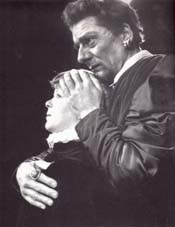
 Prior
to World War II, John Gielgud (1904-2000) had strongly resisted playing
what he regarded as unsympathetic parts. But
his success as Angelo in Peter Brook's 1950 production of Measure for Measure
took his career in a new direction, and when Brook suggested that Gielgud play
the jealous and embittered Leontes in The Winter's Tale, the actor leapt
at the opportunity. The critics were unanimous in their praise for both Gielgud
and Brook's production of the play, rarely produced because of such structural
difficulties as a sixteen year time lapse between scenes and the demise of the
character Antigonus from a bear attack (resulting in the Bard's most famous
stage direction, "Exit, pursued by a bear."). Much of the credit for
Brook's success at overcoming the play's shortcomings were laid at Gielgud's
feet. The Spectator wrote "Most of this stems from Mr. Gielgud's
very fine performance as Leontes, whose jealousy is so unquestionably real and
terrible that we are not worried by the fact that its causes are flimsy and
its consequences far-fetched." The production ran for 166 performances
in London, breaking the record set by Johnston Forbes-Robertson at the Lyceum
in 1887. "It is a virtuoso performance," wrote Richard Findlater,
"theatrically expert in conception and execution and the verse is spoken
with subtle lucidity and delicate balance. But this is something more than a
technical feat: it has the profundity of common experience, lit by the incandescent
fire of maturing genius." Prior
to World War II, John Gielgud (1904-2000) had strongly resisted playing
what he regarded as unsympathetic parts. But
his success as Angelo in Peter Brook's 1950 production of Measure for Measure
took his career in a new direction, and when Brook suggested that Gielgud play
the jealous and embittered Leontes in The Winter's Tale, the actor leapt
at the opportunity. The critics were unanimous in their praise for both Gielgud
and Brook's production of the play, rarely produced because of such structural
difficulties as a sixteen year time lapse between scenes and the demise of the
character Antigonus from a bear attack (resulting in the Bard's most famous
stage direction, "Exit, pursued by a bear."). Much of the credit for
Brook's success at overcoming the play's shortcomings were laid at Gielgud's
feet. The Spectator wrote "Most of this stems from Mr. Gielgud's
very fine performance as Leontes, whose jealousy is so unquestionably real and
terrible that we are not worried by the fact that its causes are flimsy and
its consequences far-fetched." The production ran for 166 performances
in London, breaking the record set by Johnston Forbes-Robertson at the Lyceum
in 1887. "It is a virtuoso performance," wrote Richard Findlater,
"theatrically expert in conception and execution and the verse is spoken
with subtle lucidity and delicate balance. But this is something more than a
technical feat: it has the profundity of common experience, lit by the incandescent
fire of maturing genius."
Close Window
|
 Prior
to World War II, John Gielgud (1904-2000) had strongly resisted playing
what he regarded as unsympathetic parts. But
his success as Angelo in Peter Brook's 1950 production of Measure for Measure
took his career in a new direction, and when Brook suggested that Gielgud play
the jealous and embittered Leontes in The Winter's Tale, the actor leapt
at the opportunity.
Prior
to World War II, John Gielgud (1904-2000) had strongly resisted playing
what he regarded as unsympathetic parts. But
his success as Angelo in Peter Brook's 1950 production of Measure for Measure
took his career in a new direction, and when Brook suggested that Gielgud play
the jealous and embittered Leontes in The Winter's Tale, the actor leapt
at the opportunity.